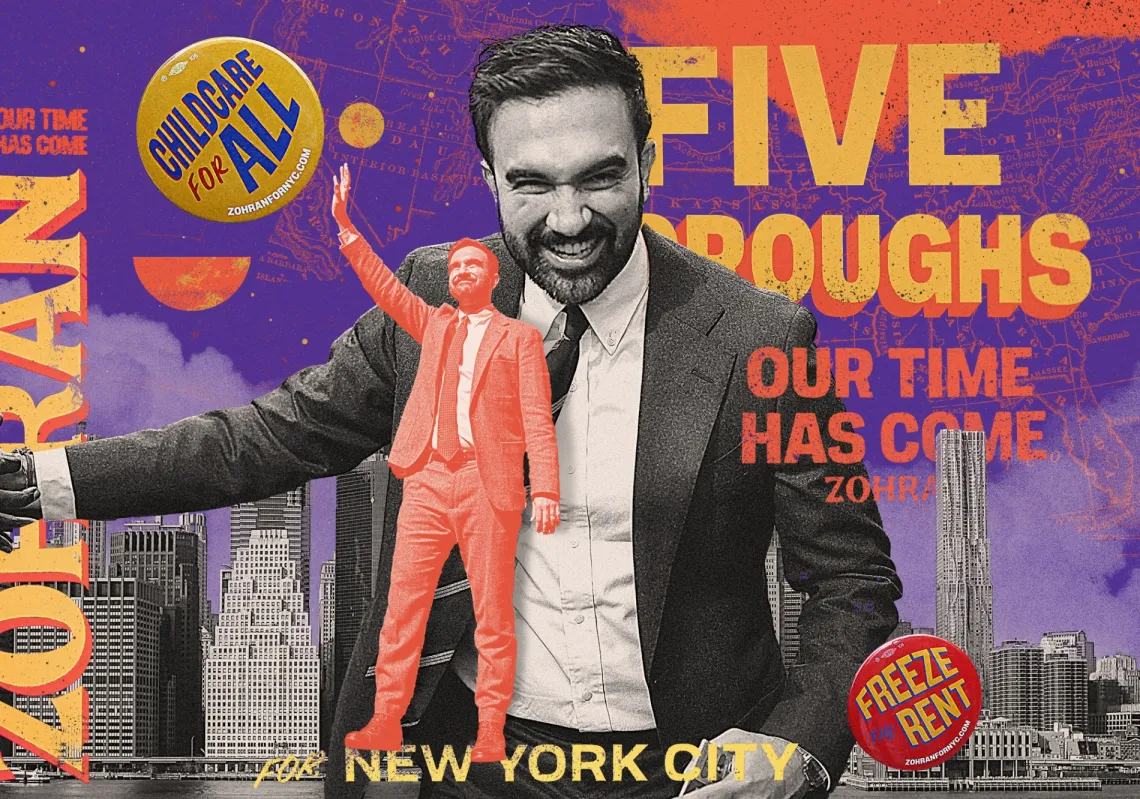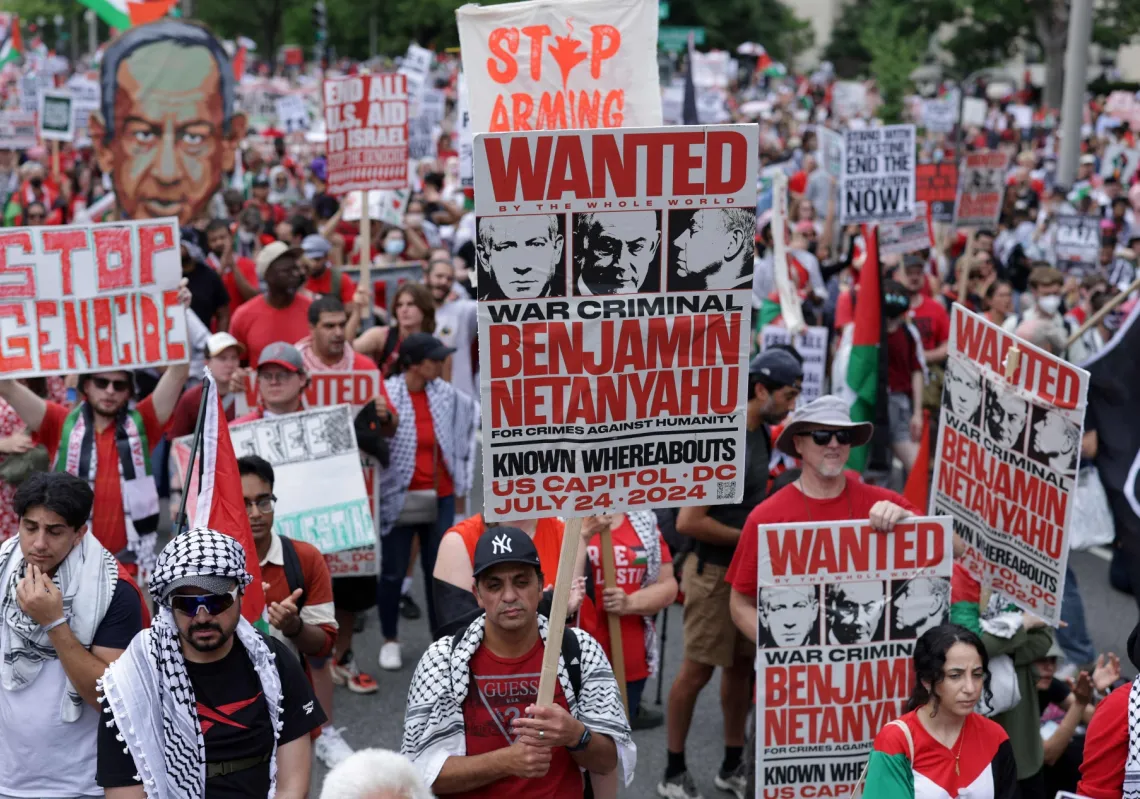The question was a trap. “The first foreign visit by a mayor of New York is always significant,” the debate moderator began. “Where would you go first?”
The candidates smiled. Most knew the expected answer. Given the fact that New York City is home to the world’s largest Jewish population outside Israel, every mayor since 1951 has made it a point to visit.
But when Zohran Mamdani leaned towards the glass podium, he didn't flinch. "I would stay in New York City and stand up for Jewish New Yorkers, meeting them wherever they are across the five boroughs.”
The tension in the room was palpable. The moderator then pressed him on whether Israel had the right to exist. “Yes,” Mamdani said. Seemingly unsatisfied with the answer, the moderator poked: “As a Jewish state?” Mamdani replied: “As a state with equal rights”.
Unbeknownst to most, that Democratic mayoral primary debate on 4 June 2025 ended up being a watershed moment in the race to the city’s general election. The answer resonated with many New Yorkers and put the candidate on the radar of voters who may have been unfamiliar with him before.
And although it wasn’t his intention, his support for Palestinian rights ended up being a major factor in his historic victory as New York’s first Muslim mayor running against former New York Governor Andrew Cuomo and Republican Curtis Sliwa.
The truth is that Mamdani never made the Gaza war central to his campaign. Discussions about Palestine were forced upon him by political opponents—notably Cuomo, a staunch supporter of Israel—who sought to paint his criticism of Israel’s prosecution of the war as antisemitic.
But the old guard misread the political moment, and their approach backfired in a spectacular way. After over two years of watching Israel’s machinery of death and destruction in Gaza unfold in real time, many Americans—especially younger progressive voters—had grown disillusioned with a political and media establishment that expected people to blindly back Israel—even as it stands accused by the United Nations of committing genocide.
But the issue is far greater than New York’s mayoral race. Mamdani’s victory appears to be a microcosm of a broader shift unfolding across the 50 states. And as Americans rethink the moral—and strategic—calculus of US support for Israel, their politicians are scrambling to keep pace.

The rise of “Z”
There is no doubt that Zohran Mamdani, known by “Z” among his close friends and family, is a talented politician. Handsome, humble, young (only 34 years old), with an enviably neat beard, and a charismatic persona, he seldom takes the bait from his many opponents and always seems to know exactly what to say at the right moment.
This could be why comparisons to Obama have been drawn. But unlike the former president, whose charisma and oratory skills also propelled him to office, Mamdani’s politics lean significantly further to the left. And given his socialist platform—centred on helping Gotham’s working class—it is hardly surprising that he has expressed compassion for Palestinians suffering under Israel’s devastating war on Gaza—and perhaps more importantly—has not shied away from holding its perpetrators to account; ie. promising to uphold an International Criminal Court warrant for Israeli Prime Minister Benjamin Netanyahu's arrest should he come to New York.
Mamdani—who was born in Uganda and hails from an intellectual South Asian family with an academic father and a filmmaking mother—galvanised a large percentage of New York City in a short amount of time. To thundering applause, he captured the astounding weight of the moment in his victory speech: “Tonight, against all odds, we have toppled a political dynasty."
The story of Mamdani’s ascent had several important stations. One of the earliest came after Donald Trump’s victory over Kamala Harris in the 2025 presidential elections. But as many Democrats rushed to blame the loss on a 'largely racist' electorate, Mamdani rushed to neighbourhoods that had swung hardest from Democrat in 2020 to Trump in 2024—multiracial, working-class places like Hillside Avenue in Queens and Fordham Road in the Bronx—and polled people on why they voted for him.
“All we heard was a desire to decrease the cost of living,” he said in one of his signature viral campaign-vérité videos. Meeting New Yorkers where they were was his strategy, and affordability was his campaign slogan. This time, it was the people—not the politician—who became the centre of the mayoral campaign.
Hearing people out on their struggles won him grassroots support. He asked food vendors about the city’s inefficient permit system, delivery drivers about traffic enforcement, and tenants about rent relief. He inverted the “Versailles model” of politics, the widening gap between the professional political class, insulated like kings and queens in Washington, and the people they claim to represent.
This could be why attempts by Zionist organisations and the media establishment to paint him as a dangerous threat simply didn’t work. So, his win wasn’t just a victory against New York oligarchs—the likes of Bill Ackman and Michael Bloomberg—but also a victory against the Israel lobby, which spent millions in its bid to defeat him.
When Mamdani began gaining support, they began panicking and fell back on Islamophobic and bad-faith attacks, painting him as a “Muslim terrorist” who would impose Sharia Law on the city. But instead of defending himself against these tired and baseless tropes, Mamdani did the unthinkable: he doubled down on his Muslim identity.
Nor did he back down from his support for Palestine. As an assembly member, he supported the Boycott, Divestment, and Sanctions (BDS) movement, formed a chapter of Students for Justice in Palestine in college, and voiced support for Mahmoud Khalil, the Columbia graduate student kidnapped by ICE agents and detained by the government for his role in campus protests against the war on Gaza.
In his mayoral campaign, he dazzled his Arab supporters with a video in impeccable Arabic (despite his claims on the contrary), and appeared eating knaffeh, the syrup-soaked cheese pastry, with a Palestinian flag behind him. His wife, Rama Duwaji, a celebrated Syrian-American artist, has also made art that has spoken out on the Gaza genocide.
Bigger than Zohran
But contrary to popular belief (at the time) Mamdani’s criticism of Israel turned out to be a boon for his mayoral race. It resonated with large swathes of American society, reflecting a broader shift in public opinion that was underway well before he came onto the political scene.
This shift could be traced all the way back to Kamala Harris’s failed presidential bid and her refusal to distance herself from Biden’s Gaza policy, which reached a critical inflexion point when the Democratic National Committee (DNC) refused to allow a Palestinian American speaker on the convention’s main stage at the United Centre in Chicago in August 2024. Had Harris shown moral probity, she might have kept disillusioned voters from defecting.
Today, American support for the Israeli government’s genocide in Gaza is undergoing a profound reversal. Among Democratic voters, sympathy for the Israeli government has plummeted, while solidarity with Palestinians has grown. This is incentivising some politicians to enter largely unchartered territory: distancing themselves, rather than cozying up to pro-Israel lobby groups.
The American Israel Public Affairs Committee (AIPAC)—a pro-Israel lobbying group that wields enormous power in Washington—is becoming an increasingly toxic brand for some Democrats on Capitol Hill. As outrage over Israel's conduct in Gaza grows—especially over its forced starvation campaign—AIPAC’s argument that the carnage is a “just and moral” war against Hamas is increasingly falling on deaf ears. More and more, support for Israel is being seen as a liability at the ballot box, rather than an asset.
A sign of this sea change can be seen in Graham Platner—a Democrat running for the US Senate in Maine. His “Mainers First” campaign not only centres on the working class but also openly opposes Washington’s support for Israel’s war in Gaza. He has rejected donations from AIPAC, making it a point to publicly set himself apart from Senator Susan Collins, his Republican opponent, who has accepted at least $647,758 from pro-Israel lobbying groups.
Read more: AIPAC contends with an increasingly critical American left















